- Home
- Kahlil Gibran
Collected Poetical Works of Kahlil Gibran Page 12
Collected Poetical Works of Kahlil Gibran Read online
Page 12
But He avoided them and turned aside from them, and walked towards the north gate of the city.
And He said to us, “My hour has not yet come. Many are the things I have still to say unto you, and many are the deeds I shall yet perform ere I deliver myself up to the world.”
Then He said, and there was joy and laughter in His voice, “Let us go into the North Country and meet the spring. Come with me to the hills, for winter is past and the snows of Lebanon are descending to the valleys to sing with the brooks.
“The fields and the vineyards have banished sleep and are awake to greet the sun with their green figs and tender grapes.”
And He walked before us and we followed Him, that day and the next.
And upon the afternoon of the third day we reached the summit of Mount Hermon, and there He stood looking down upon the cities of the plains.
And His face shone like molten gold, and He outstretched His arms and He said to us, “Behold the earth in her green raiment, and see how the streams have hemmed the edges of her garments with silver.
“In truth the earth is fair and all that is upon her is fair.
“But there is a kingdom beyond all that you behold, and therein I shall rule. And if it is your choice, and if it is indeed your desire, you too shall come and rule with me.
“My face and your faces shall not be masked; our hand shall hold neither sword nor sceptre, and our subjects shall love us in peace and shall not be in fear of us.”
Thus spoke Jesus, and unto all the kingdoms of the earth I was blinded, and unto all the cities of walls and towers; and it was in my heart to follow the Master to His kingdom.
Then just at that moment Judas of Iscariot stepped forth. And he walked up to Jesus, and spoke and said, “Behold, the kingdoms of the world are vast, and behold the cities of David and Solomon shall prevail against the Romans. If you will be the king of the Jews we shall stand beside you with sword and shield and we shall overcome the alien.”
But when Jesus heard this He turned upon Judas, and His face was filled with wrath. And He spoke in a voice terrible as the thunder of the sky and He said, “Get you behind me, Satan. Think you that I came down the years to rule an ant-hill for a day?
“My throne is a throne beyond your vision. Shall he whose wings encircle the earth seek shelter in a nest abandoned and forgotten?
“Shall the living be honoured and exalted by the wearer of shrouds?”
“My kingdom is not of this earth, and my seat is not builded upon the skulls of your ancestors.
“If you seek aught save the kingdom of the spirit then it were better for you to leave me here, and go down to the caves of your dead, where the crowned heads of yore hold court in their tombs and may still be bestowing honours upon the bones of your forefathers.
“Dare you tempt me with a crown of dross, when my forehead seeks the Pleiades, or else your thorns?
“Were it not for a dream dreamed by a forgotten race I would not suffer your sun to rise upon my patience, nor your moon to throw my shadow across your path.
“Were it not for a mother’s desire I would have stripped me of the swaddling-clothes and escaped back to space.
“And were it not for sorrow in all of you I would not have stayed to weep.
“Who are you and what are you, Judas Iscariot? And why do you tempt me?
“Have you in truth weighed me in the scale and found me one to lead legions of pygmies, and to direct chariots of the shapeless against an enemy that encamps only in your hatred and marches nowhere but in your fear?
“Too many are the worms that crawl about me feet, and I will give them no battle. I am weary of the jest, and weary of pitying the creepers who deem me coward because I will not move among their guarded walls and towers.
“Pity it is that I must needs pity to the very end. Would that I could turn my steps towards a larger world where larger men dwell. But how shall I?
“Your priest and your emperor would have my blood. They shall be satisfied ere I go hence. I would not change the course of the law. And I would not govern folly.
“Let ignorance reproduce itself until it is weary of its own offspring.
“Let the blind lead the blind to the pitfall.
“And let the dead bury the dead till the earth be choked with its own bitter fruit.
“My kingdom is not of the earth. My kingdom shall be where two or three of you shall meet in love, and in wonder at the loveliness of life, and in good cheer, and in remembrance of me.”
Then of a sudden He turned to Judas, and He said, “Get you behind me, man. Your kingdoms shall never be in my kingdom.”
And now it was twilight, and He turned to us and said, “Let us go down. The night is upon us. Let us walk in light while the light is with us.”
Then He went down from the hills and we followed Him. And Judas followed afar off.
And when we reached the lowland it was night.
And Thomas, the son of Diophanes, said unto Him, “Master, it is dark now, and we can no longer see the way. If it is in your will, lead us to the lights of yonder village where we may find meat and shelter.”
And Jesus answered Thomas, and He said, “I have led you to the heights when you were hungry, and I have brought you down to the plains with a greater hunger. But I cannot stay with you this night. I would be alone.”
Then Simon Peter stepped forth, and said:
Master, suffer us not to go alone in the dark. Grant that we may stay with you even here on this byway. The night and the shadows of the night will not linger, and the morning shall soon find us if you will but stay with us.”
And Jesus answered, “This night the foxes shall have their holes, and the birds of the air their nests, but the Son of Man has not where on earth to lay His head. And indeed I would now be alone. Should you desire me you will find me again by the lake where I found you.”
Then we walked away from Him with heavy hearts, for it was not in our will to leave Him.
Many times did we stop and turn our faces towards Him, and we saw him in lonely majesty, moving westward.
The only man among us who did not turn to behold Him in His aloneness was Judas Iscariot.
And from that day Judas became sullen and distant. And methought there was danger in the sockets of his eyes.
ANNA THE MOTHER OF MARY
On the Birth of Jesus
Jesus the son of my daughter, was born here in Nazareth in the month of January. And the night that Jesus was born we were visited by men from the East. They were Persians who came to Esdraelon with the caravans of the Midianites on their way to Egypt. And because they did not find rooms at the inn they sought shelter in our house.
And I welcomed them and I said, “My daughter has given birth to a son this night. Surely you will forgive me if I do not serve you as it behoves a hostess.”
Then they thanked me for giving them shelter. And after they had supped they said to me: “We would see the new-born.”
Now the Son of Mary was beautiful to behold, and she too was comely.
And when the Persians beheld Mary and her babe, they took gold and silver from their bags, and myrrh and frankincense, and laid them all at the feet of the child.
Then they fell down and prayed in a strange tongue which we did not understand.
And when I led them to the bedchamber prepared for them they walked as if they were in awe at what they had seen.
When morning was come they left us and followed the road to Egypt.
But at parting they spoke to me and said, “The child is not but a day old, yet we have seen the light of our God in His eyes and the smile of our God upon His mouth.
“We bid you protect Him that He may protect you all.”
And so saying, they mounted their camels and we saw them no more.
Now Mary seemed not so much joyous in her first-born, as full of wonder and surprise.
She would look upon her babe, and then turn her face to the window and gaze far away into
the sky as if she saw visions.
And there were valleys between her heart and mine.
And the child grew in body and in spirit, and He was different from other children. He was aloof and hard to govern, and I could not lay my hand upon Him.
But He was beloved by everyone in Nazareth, and in my heart I knew why.
Oftentimes He would take away our food to give to the passer-by. And He would give other children the sweetmeat I had given Him, before He had tasted it with His own mouth.
He would climb the trees of my orchard to get the fruits, but never to eat them Himself.
And He would race with other boys, and sometimes, because He was swifter of foot, He would delay so that they might pass the stake ere He should reach it.
And sometimes when I led Him to His bed He would say, “Tell my mother and the others that only my body will sleep. My mind will be with them till their mind come to my morning.”
And many other wondrous words He said when He was a boy, but I am too old to remember.
Now they tell me I shall see Him no more. But how shall I believe what they say?
I still hear His laughter, and the sound of His running about my house. And whenever I kiss the cheek of my daughter His fragrance returns to my heart, and His body seems to fill my arms.
But is it not passing strange that my daughter does not speak of her first-born to me?
Sometimes it seems that my longing for Him is greater than hers. She stands as firm before the day as if she were a bronzen image, while my heart melts and runs into streams.
Perhaps she knows what I do not know. Would that she might tell me also.
ASSAPH CALLED THE ORATOR OF TYRE
On the Speech of Jesus
What shall I say of His speech? Perhaps something about His person lent power to His words and swayed those who heard Him. For He was comely, and the sheen of the day was upon His countenance.
Men and women gazed at Him more than they listened to His argument. But at times He spoke with the power of a spirit, and that spirit had authority over those who heard Him.
In my youth I had heard the orators of Rome and Athens and Alexandria. The young Nazarene was unlike them all.
They assembled their words with an art to enthral the ear, but when you heard Him your heart would leave you and go wandering into regions not yet visited.
He would tell a story or relate a parable, and the like of His stories and parables had never been heard in Syria. He seemed to spin them out of the seasons, even as time spins the years and the generations.
He would begin a story thus: “The ploughman went forth to the field to sow his seeds.”
Or, “Once there was a rich man who had many vineyards.”
Or, “A shepherd counted his sheep at eventide and found that one sheep was missing.”
And such words would carry His listeners into their simpler selves, and into the ancient of their days.
At heart we are all ploughmen, and we all love the vineyard. And in the pastures of our memory there is a shepherd and a flock and the lost sheep.
And there is the plough-share and the winepress and the threshing-floor.
He knew the source of our older self, and the persistent thread of which we are woven.
The Greek and the Roman orators spoke to their listeners of life as it seemed to the mind. The Nazarene spoke of a longing that lodged in the heart.
They saw life with eyes only a little clearer than yours and mine. He saw life in the light of God.
I often think that He spoke to the crowd as a mountain would speak to the plain.
And in His speech there was a power that was not commanded by the orators of Athens or of Rome.
MARY MAGDALENE
On Meeting Jesus for the First Time
It was in the month of June when I saw Him for the first time. He was walking in the wheat field when I passed by with my handmaidens, and He was alone.
The rhythm of His steps was different from other men’s, and the movement of His body was like naught I had seen before.
Men do not pace the earth in that manner. And even now I do not know whether He walked fast or slow.
My handmaidens pointed their fingers at Him and spoke in shy whispers to one another. And I stayed my steps for a moment, and raised my hand to hail Him. But He did not turn His face, and He did not look at me. And I hated Him. I was swept back into myself, and I was as cold as if I had been in a snow-drift. And I shivered.
That night I beheld Him in my dreaming; and they told me afterward that I screamed in my sleep and was restless upon my bed.
It was in the month of August that I saw Him again, through my window. He was sitting in the shadow of the cypress tree across my garden, and He was still as if He had been carved out of stone, like the statues in Antioch and other cities of the North Country.
And my slave, the Egyptian, came to me and said, “That man is here again. He is sitting there across your garden.”
And I gazed at Him, and my soul quivered within me, for He was beautiful.
His body was single and each part seemed to love every other part.
Then I clothed myself with raiment of Damascus, and I left my house and walked towards Him.
Was it my aloneness, or was it His fragrance, that drew me to Him? Was it a hunger in my eyes that desired comeliness, or was it His beauty that sought the light of my eyes?
Even now I do not know.
I walked to Him with my scented garments and my golden sandals, the sandals the Roman captain had given me, even these sandals. And when I reached Him, I said, “Good-morrow to you.”
And He said, “Good-morrow to you, Miriam.”
And He looked at me, and His night-eyes saw me as no man had seen me. And suddenly I was as if naked, and I was shy.
Yet He had only said, “Good-morrow to you.”
And then I said to Him, “Will you not come to my house?”
And He said, “Am I not already in your house?”
I did not know what He meant then, but I know now.
And I said, “Will you not have wine and bread with me?”
And He said, “Yes, Miriam, but not now.”
Not now, not now, He said. And the voice of the sea was in those two words, and the voice of the wind and the trees. And when He said them unto me, life spoke to death.
For mind you, my friend, I was dead. I was a woman who had divorced her soul. I was living apart from this self which you now see. I belonged to all men, and to none. They called me harlot, and a woman possessed of seven devils. I was cursed, and I was envied.
But when His dawn-eyes looked into my eyes all the stars of my night faded away, and I became Miriam, only Miriam, a woman lost to the earth she had known, and finding herself in new places.
And now again I said to Him, “Come into my house and share bread and wine with me.”
And He said, “Why do you bid me to be your guest?”
And I said, “I beg you to come into my house.” And it was all that was sod in me, and all that was sky in me calling unto Him.
Then He looked at me, and the noontide of His eyes was upon me, and He said, “You have many lovers, and yet I alone love you. Other men love themselves in your nearness. I love you in your self. Other men see a beauty in you that shall fade away sooner than their own years. But I see in you a beauty that shall not fade away, and in the autumn of your days that beauty shall not be afraid to gaze at itself in the mirror, and it shall not be offended.
“I alone love the unseen in you.”
Then He said in a low voice, “Go away now. If this cypress tree is yours and you would not have me sit in its shadow, I will walk my way.”
And I cried to Him and I said, “Master, come to my house. I have incense to burn for you, and a silver basin for your feet. You are a stranger and yet not a stranger. I entreat you, come to my house.”
Then He stood up and looked at me even as the seasons might look down upon the field, and He smiled
. And He said again: “All men love you for themselves. I love you for yourself.”
And then He walked away.
But no other man ever walked the way He walked. Was it a breath born in my garden that moved to the east? Or was it a storm that would shake all things to their foundations?
I knew not, but on that day the sunset of His eyes slew the dragon in me, and I became a woman, I became Miriam, Miriam of Mijdel.
PHILEMON A GREEK APOTHECARY
On Jesus the Master Physician
The Nazarene was the Master Physician of His people. No other man knew so much of our bodies and of their elements and properties.
He made whole those who were afflicted with diseases unknown to the Greeks and the Egyptians. They say He even called back the dead to life. And whether this be true or not true, it declares His power; for only to him who has wrought great things is the greatest ever attributed.
They say also that Jesus visited India and the Country between the Two Rivers, and that there the priests revealed to Him the knowledge of all that is hidden in the recesses of our flesh.
Yet that knowledge may have been given to Him direct by the gods, and not through the priests. For that which has remained unknown to all men for an eon may be disclosed to one man in but a moment. And Apollo may lay his hand on the heart of the obscure and make it wise.
Many doors were open to the Tyrians and the Thebans, and to this man also certain sealed doors were opened. He entered the temple of the soul, which is the body; and He beheld the evil spirits that conspire against our sinews, and also the good spirits that spin the threads thereof.
Methinks it was by the power of opposition and resistance that He healed the sick, but in a manner unknown to our philosophers. He astonished fever with His snow-like touch and it retreated; and He surprised the hardened limbs with His own calm and they yielded to Him and were at peace.
He knew the ebbing sap within the furrowed bark – but how He reached the sap with His fingers I do not know. He knew the sound steel underneath the rust – but how He freed the sword and made it shine no man can tell.

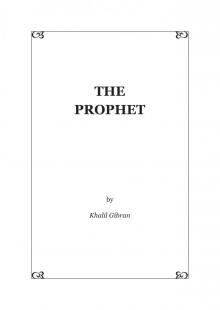 The Prophet
The Prophet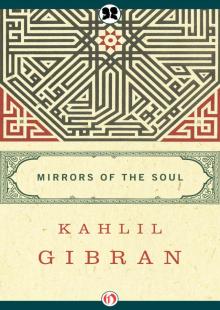 Mirrors of the Soul
Mirrors of the Soul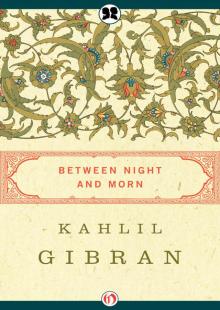 Between Night and Morn
Between Night and Morn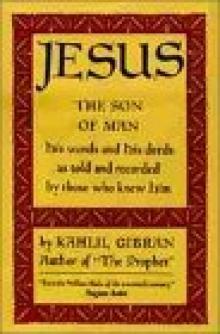 Jesus the Son of Man
Jesus the Son of Man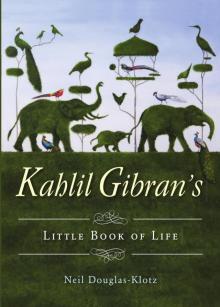 The Little Book of Life's Wisdom
The Little Book of Life's Wisdom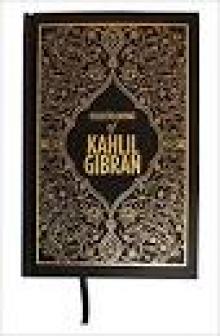 The Kahlil Gibran Collection
The Kahlil Gibran Collection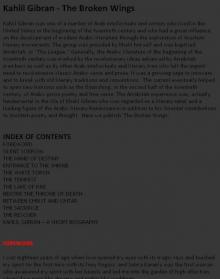 The Broken Wings
The Broken Wings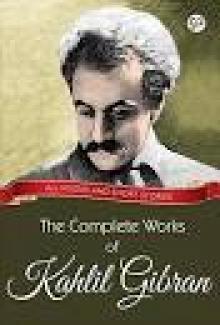 Collected Poetical Works of Kahlil Gibran
Collected Poetical Works of Kahlil Gibran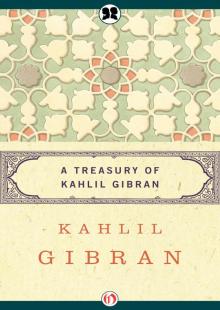 The Treasured Writings of Kahlil Gibran
The Treasured Writings of Kahlil Gibran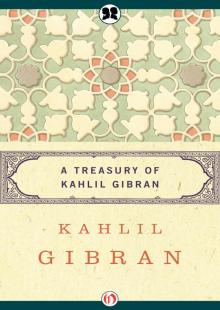 Treasury of Kahlil Gibran
Treasury of Kahlil Gibran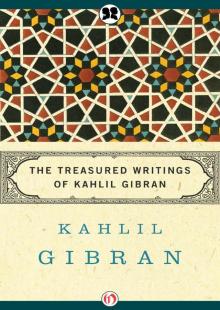 Treasured Writings of Kahlil Gibran
Treasured Writings of Kahlil Gibran